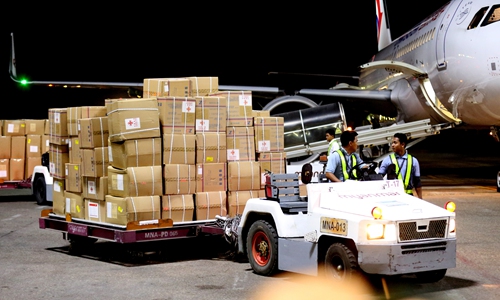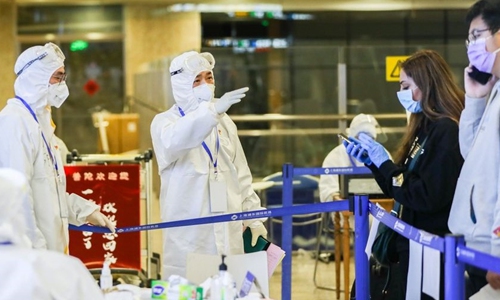HOME >> CHINA
Strictest foreigner entry policy proactive to cutting infections
By GT staff reporters Source:Global Times Published: 2020/3/27 23:13:40 Last Updated: 2020/3/28 16:40:52
Limited impact seen for economic exchanges

Airport workers unload medical supplies from China in Yangon, Myanmar on Friday. A batch of Chinese government aid products to fight the COVID-19 arrived in Yangon on Thursday evening. Photo: Xinhua
China has taken its strictest measure toward foreigners since the opening-up and reform, which temporarily forbids foreign nationals from entering the border to avoid a second wave of the coronavirus outbreak. Experts said the unprecedented move is necessary and responsible, given that the pandemic has been worsening overseas and China's precautionary measures could avoid the emergence of another Wuhan.
Starting Saturday, foreign nationals will temporarily be denied from entering China even with valid visas, the Chinese Ministry of Foreign Affairs and National Immigration Administration announced in a notice Thursday night, in a move called by some experts as "semi sealing off of the border" that signals the country's determination to fight the epidemic.
The notice said China does not shun all foreign nationals. It says foreign passport holders coming to China for necessary economic, trade, scientific or technological activities or out of emergency humanitarian needs can apply for new visas at Chinese embassies or consulates. Entry by foreign nationals with visas issued after this announcement will not be affected.
This is the strictest measure taken toward foreigners since China's opening-up and reform, which is also an unprecedented step, reflecting the country's decisive and aggressive COVID-19 epidemic prevention and control work, Li Haidong, a professor at the Institute of International Relations of China Foreign Affairs University, told the Global Times.
The spread of the pandemic all over the world shows that it's still rising and has not peaked. For China, the imported infections are an urgent challenge and if this cannot be dealt with properly, our efforts over the past months could be ruined, so we have taken this measure, which will also benefit the world, Li said.
The notice also explained that the suspension is a temporary measure that China is "compelled to take in light of the outbreak situation and the practices of other countries." China will stay in close touch with all sides and properly handle personnel exchanges with the rest of the world under special circumstances. These measures will be calibrated in light of the evolving situation and announced accordingly, it said.
Experts noted that the newly released measure won't have too much impact on foreign companies' operations in China and necessary trade and business activities, and won't hinder China's exports of medical supplies to virus-hit foreign countries.
The pandemic has caused more than 490,000 cases worldwide, affecting more than 170 countries and regions and leading to 22,184 deaths, according to data compiled by Johns Hopkins University and Medicine.
As of Thursday, China has reported 595 imported cases, with the capital Beijing shouldering the heaviest burden of receiving those patients. The UK is the biggest source of imported cases, according to statistics.
"We can't afford to see cities like Beijing, Shanghai and Guangzhou become a second Wuhan, given the pandemic has been worsening overseas," Yang Zhanqiu, a virologist at Wuhan University, told the Global Times.
The policy is necessary as an outbreak rebound would seriously affect Chinese social and economic development, Yang said.

Staff members check the information of passengers entering China at the Pudong International Airport in Shanghai, east China, March 18.Photo:Xinhua
Leaving a channel openMei Xinyu, a research fellow at the Chinese Academy of International Trade and Economic Cooperation under the Ministry of Commerce, told the Global Times that the measures China has taken are thoughtful as it leaves a channel open for foreigners who work in the trade and technology sectors.
It's necessary to keep open such a channel, as the country, which is the world's factory and largest manufacturer, is resuming work amid the outbreak, Mei said. He noted that it will play a decisive role in stabilizing global economy.
While some Western media outlets have voiced concern that these new measures, including a reduction in domestic and international flights by the Aviation Administration of China, may make it harder for other countries to import medical supplies from China, a Chinese medical gear company said this is not a problem.
"The cut in international flights will not hinder China's exports of medical supplies to virus-hit countries because governments will resort to charter flights, which would help them get the products," a manager surnamed Chang with a Beijing-based medical gear exporter told the Global Times on Friday.
The decision would hit private exporters as freight capacity would also be restricted due to the flight cut, he added.
Meanwhile, several employees at foreign companies in China told the Global Times on Friday that the new regulation won't have too much of an impact on their businesses.
Cha Sheng, general manager of VorWerk China, told the Global Times on Friday, "As the virus hit globally, face-to-face business activities are unlikely at present and all of us work at home, so the restrictions would not affect us that much."
"The halt in business travel will have greater advantages than disadvantages for foreign firms in China. Our largest challenge does not lie in personnel turnover, but decreasing demand for our products from global markets," Cha said.
"From a business perspective, I don't think the new policy will have any impact on our company's operations," Sun, a white-collar worker at a US-based world-leading tech firm in Beijing, told the Global Times on Friday.
"Our company already issued a travel ban to Asia in mid-January, and then after February, all employees globally were not allowed to travel abroad, to anywhere until June," Sun said.
Posted in: SOCIETY